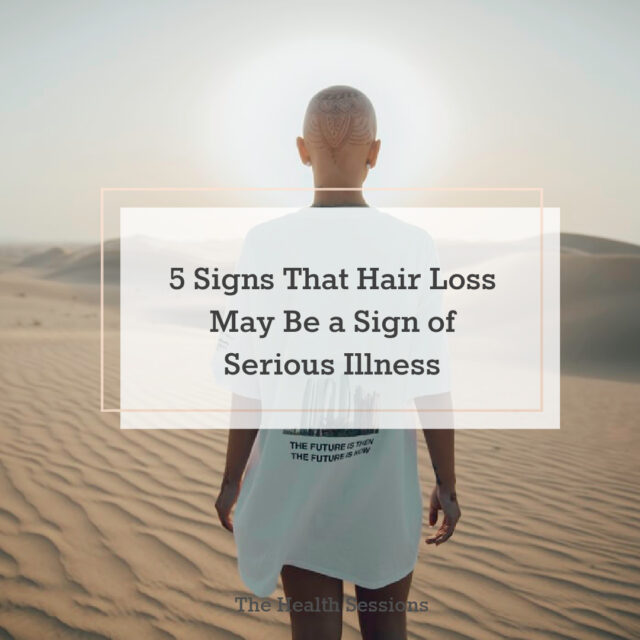7 Inspiring Reads about Living with Chronic Illness

This article is written by Lee Walters.
Besides protecting and insulating our scalp, the hair on our head is mother nature’s organic style accessory, as it also complements our beauty. A voluminous and shiny mane with plenty of movement is what most people consider healthy and find attractive. So, it’s perfectly reasonable for your heart to skip a beat when you find a clump of hair in the drain.
Debilitated, feeble, and fragile hair is often associated with health issues, and hair loss can signal the existence of an underlying medical condition. Other times, it can only be a result of improper hair care.
Read through our article to find out when it’s time to visit your dermatologist or physician, or when to change your favorite shampoo brand.
Before you start panicking about the clump of hair you found in your drain, it’s essential to know that you naturally shed hair. According to the American Academy of Dermatologists, losing anywhere between 50 to 100 strands a day is perfectly normal. Depending on your hair type and the length, losing those strands may be more noticeable.
For individuals with longer hair, the loose and disconnected strands stay entangled. As you shower and wash it, those strands get removed through the rinsing process and congregate near the drain. So, if you have long strands, it’s perfectly normal to see more than 100 in your drain or on your brush – it’s just your everyday shedding.
Numerous factors affect shedding, and the way you style your locks is one of them. On average, women tend to lose more strands than men because they’re much more likely to expose it to heat and color treatments. Approximately 40% of women lose extra strands because of the way they style and color their hair.

Hair loss has many causes and discovering the cause can help you prevent, reduce, or treat it. Here’s a list of causes we found:
Most people notice some hair loss as they age. This is entirely natural since the hair growth slows, and some follicles completely stop growing. It may cause the hair on the scalp to become thinner progressively, lose its color, and cause a hairline to recede.
Besides age, it can also largely depend on genetics and this type of hair loss is often unavoidable. Your genetic predisposition plays a crucial role in determining the quality and type of your locks, as well as any possible shedding. Male pattern baldness is associated with the individual’s genetic make-up, though it’s not explicitly caused by genetics alone.
Bald spots, breakage, and thinning can be caused by an underlying medical condition such as alopecia, a thyroid condition, lupus, nutritional deficiencies, and other types of diseases. Conditions like autoimmune alopecia can cause loss of eyelashes or eyebrows. Depending on the type of alopecia, it may also affect the scalp, causing the loss of larger quantities of hair.
A scalp infection on the other hand can cause scaliness and inflammation of the scalp. If left untreated, it can lead to losing strands and bald spots. Treating the infection and inflammation does allow strands to grow back.
Many types of medication have hair loss as a side effect, though this rarely occurs. Blood pressure medication and drugs that reduce cholesterol are known to cause shedding in approximately 1% of users. If you’re experiencing it, which you believe could be related to your ongoing therapy, please immediately contact your physician.
Cancer treatments and medications like chemotherapy are also a cause of hair loss. Like Hodgkin’s lymphoma, some types of cancer may cause hair loss, but chemotherapy is still the primary cancer-related cause. You may lose most, if not all, of your hair within the first few weeks of starting chemotherapy or radiation treatment. Luckily, it begins to regrow after you finish your therapy.
Moreover, exposure to poisonous substances, no matter how minute, can lead to hair loss over time. Ingesting large quantities of otherwise safe substances, like Vitamin A and selenium, can also be toxic and can lead to shedding. Luckily, it tends to grow back once the exposure ceases.

Stress, both psychological and physical, can contribute to increased shedding and loss of hair. Recovering from an illness, hormonal imbalance, injury, surgical intervention, or childbirth takes its toll on the body and can cause excessive shedding. The same can happen after a stressful life event, like the death of a loved one or a divorce.
Whilst, hormonal imbalances caused by polycystic ovaries syndrome or certain birth control pills can cause a temporary hormonal imbalance. Developing a hormonal imbalance can cause hair loss in women.
Hairstyles that pull our locks can be detrimental to its health. Wearing it tightly pulled back can lead to permanent hair loss, as continuous pulling weakens the follicles. This condition is known as traction alopecia, and though it takes time to develop, it’s often permanent, without any hope of regrowth.
Moreover, improper hair care can also be a culprit for hair fall and thinning. Coloring, perming, or even relaxing can be detrimental to your follicles. Over time, the damaged follicles will stop growing hair, and damaging too many follicles can cause bald spots. You can avert the damage by changing the way you care and style your locks.
Friction alopecia is a condition people develop on their bodies. It appears on skin areas where tight clothing, socks, or boots rub against the skin. You may experience body hair loss on those areas due to continuous friction, but it regrows on its own once the rubbing stops.

If your hair loss is accompanied by the following symptoms, please check with your doctor or other medical professionals to rule out more serious problems.
If it’s accompanied by a lack of energy may be the result of malnourishment or an imbalanced diet. If you’re not getting enough nutrients, you may experience a lack of energy, weight loss, and hair loss as a side effect.
Hypothyroidism is a hormonal autoimmune hormone imbalance that may cause fatigue, weight gain, muscle aches, and hair loss. If you’re experiencing muscle aches and increased shedding, it’s recommended to consult your physician right away.
Hair loss in multiple areas could signal autoimmune condition alopecia, like alopecia areata or Alopecia Universalis. These can cause hair loss in places besides the scalp, as the body mistakes the follicles for foreign bodies and attacks them, causing them to fall out. Other autoimmune conditions, like thyroid disease and lupus, might also cause non-scalp hair loss.
Lupus, an autoimmune disease accompanied by hair loss, can cause a full-body rash to appear. Besides causing rashes and hair loss, lupus symptoms also include dry eyes and joint pain. Please visit your physician if you’re experiencing any of these symptoms.
Brittle nails, accompanied by hair loss, are a sign of iron deficiency, caused by the lack of healthy red blood cells. Iron deficiency may also cause you to feel tired and weak, induce chest pain, and cold feet and hands. The condition is treatable with iron supplements under medical supervision.
Hair loss often occurs in individuals suffering from some medical condition or illness:

Several vitamins play a crucial role in maintaining the health of your locks, including vitamins A, B, C, and most notably, vitamin D. Vitamin D is known for its immunomodulatory effects, and its deficiency has been linked to several conditions, including alopecia.
As we already mentioned above, androgenetic alopecia is a condition that causes bald patches on the scalp, commonly known as male pattern and female pattern baldness.
Depending on the cause, effective treatments for some types of hair loss are available. These treatments may include both over-the-counter and prescription medication, as well as surgical hair transplants. It’s highly recommended that you consult with your physician and dermatologist if you’re experiencing excessive shedding.
Good nutrition is key to good health, which also includes the health of your mane. However, there are certain types of food you may want to avoid if you’re worried about the number of strands on your scalp. These include simple carbohydrates, sugary cereals, greasy foods, dairy products, and sugar-free foods rich in artificial sweeteners.
If you’re worried about a clump of hair found in your drain, there’s a good chance that you’re just experiencing everyday shedding. Remember, your scalp may shed anywhere from 50 to 100 strands a day, or even more.
Excessive shedding, sudden thinning, and rapid hair loss accompanied by muscle aches, tiredness, and other symptoms described in this article, demand medical attention. If you’re experiencing hair loss with any of these symptoms, don’t hesitate to visit a doctor.
Author bio: Lee Walters is the owner of The Hair Central website. Addicted to hair and grooming. A loving dad of 3 adorable kids, a good friend to hang out with plus a free grooming advice to boot!